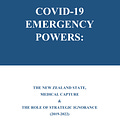Emergency Powers: [12] Doctors: Lined up & suspended for practicing informed consent.
From my April 2022 paper COVID-19 Emergency Powers: The New Zealand State, Medical Capture & the Role of Strategic Ignorance
Chapter 12
The culture that can be observed across the health system has provided the environment for the Medical Council of New Zealand (MCNZ) to declare that they have ‘zero tolerance’ for so-called ‘anti-vax’ messages.
The implication of the MCNZ making such a statement is alarming, as part of the MCNZ’s are tasked with ensuring that the New Zealand public are not put at risk from exposure to unsafe medicine or inappropriate medical treatment that doesn’t reflect patient needs. The MCNZ’s stance, infers that informed consent and medical autonomy can no longer be taken for granted. Their stance has ruptured their role as regulator of the social contract between the doctor and patient, that is underpinned by the maxim ‘first, do no harm’.
The MCNZ’s actions send a further chilling message, that state-mandated medication must be accepted, that the MCNZ are not an independent arbiter, and that neither the doctor nor patient have latitude to question the decision of the state, no matter the provenance nor safety profile of a medical intervention.
Several doctors have had their license suspended after their COVID-19 behaviour and views have been reported to the Medical Council. In the 2020-2022 COVID-19 pandemic, in New Zealand, doctors have been brought before the Medical Council of New Zealand because they have insisted on discussing the infection fatality rate as it relates to their patient in a given age range; for discussing the potential for the mRNA genetic vaccine to cause harm; for transparency on the short-circuiting of safety trials; and for suggesting vaccine alternatives. In an April 2021 decision two suspended doctors have won district court appeals, but the MCNZ may appeal the decision.
Most, if not all of these doctors have been operating medical clinics that have vaccinated their populations for three decades or more. However, through their insistence on practicing informed consent and their caution over a novel mRNA genetic vaccine, they have been misleadingly shamed as anti-vaxxers (here and here). This strategy of discrediting clinical and public health experts has been a phenomenon repeated across the globe during the pandemic.
The informed consent process helps people of all risk profiles assess their relative risk to a medical treatment. This is normally a process undertaken for medical treatments that have had years of use, with well recognised safety profiles. The principle of informed consent was in place to stop people from having medication they do not need. It also appears that risk was not appropriately communicated when the public were at a site of administration of the genetic vaccine. The mRNA genetic vaccine did not have a legacy safety profile, and this was highlighted in an open letter by New Zealand Doctors Speaking out with Science (NZDSOS).
The NZDSOS considered that the New Zealand public should be informed of the absolute risk, their potential for hospitalisation and death by age and multimorbid status – following infection from Sars-Cov-2 – versus their risk of hospitalisation death from the mRNA genetic vaccine.
The open letter iterated that the state had not taken steps to make the infection fatality rate transparent, even though risk was stratified by age, and so people could not understand the risk-benefit ratio, in addition, the status of previously infected people was never discussed.
The public cannot conduct an Official Information Act (OIA) request to the MCNZ, a democratically unaccountable institution, to all appearances. There is no clear complaints mechanism and anonymous complaints are accepted (which reduces transparency and accountability).
The combined power of the machinery of government, the media and the Medical Council of New Zealand has resulted in doctors who have vaccinated their populations for over 30 years, shamed as ‘anti-vaxxers’ – when they are instead, simply insisting on their patients’ rights to maintain informed consent.
The culture of medicalisation, the emergency approval, and the apparent predetermination that all people will receive the genetic vaccine, has enabled authorities to evade historically required processes that ensure safety.
There is no requirement for mandatory reporting of adverse incidents including hospitalisation, disability and death; there are no years of safety data to support injection of the genetic vaccine into pregnant women, infants, and children and healthy young people.
It's also evident that the COVID-19 pandemic has been a financial blessing for clinicians who might be struggling with the economic costs of financing medical education, or onerous mortgages on medical clinics.
While the following information has not been confirmed with the relevant institution, each nasal swab was alleged to return $135 per person; a visit to a vehicle dressed in full personal protective equipment to return $250. A total of $385 per person. A visit to a car with two symptomatic people would return $770. This was not only financially lucrative, but doctors were incentivised to declare patients were symptomatic, if they were to be paid.
Continue reading: Emergency Powers: [13] Appropriating the agency of medical experts here
References are available on the original PDF at TalkingRisk.NZ


